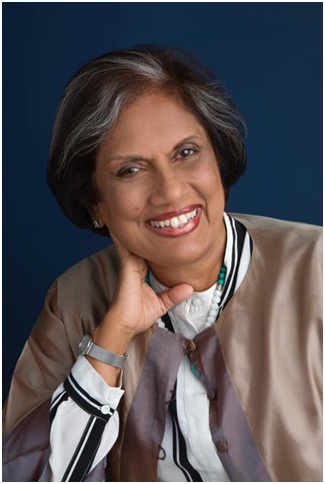Her Excellency Chandrika Bandaranaike Kumaratunga, Chair, South Asia Policy & Research Institute (SAPRI)

Her Excellency Chandrika Bandaranaike Kumaratunga was the fourth Executive President of the Democratic Socialist Republic of Sri Lanka, from 1994 to 2005.
In a political career spanning over three decades, she was elected, Chief Minister of the Western Province in 1993 in a land slide victory; Prime Minister in August 1994; Executive President in November 1994, followed by a second term in 1999, both by massive popular votes.
She retired from active politics in 2005, after serving two terms as Executive President.
Having inherited in 1994 a government and nation plagued by violent politics, due to the civil war between the government and a separatist terror group, her government re-established democracy, democratic institutions and respect for Human Rights. It also effectively curbed rampant corruption within the State by enacting new laws, institutions and procedures. The policy of her government was that Minority Rights must be granted and that the resolution of war and the ethnic conflict could not be achieved with arms alone but through a political solution as well.
She proposed, for the first time in Sri Lankan history, an extensive devolution of power through a federal system of government, in place of the separate State demanded by the rebels, and, entered into two Cease Fire agreements and negotiations with the rebels. She also signed a landmark agreement with the LTTE viz the P-TOMS as an effective first step towards cooperation between the government and the LTTE.
She is the first Sri Lankan leader, in 60 years of Independence to have spoken against extremism and worked towards building, understanding and integration between all Sri Lankan communities. She continued with her policy of negotiations with the rebels, even after they attempted to assassinate her and badly wounded her.
Her Government’s economic policy, “free market economy with a human face” was designed to give access to the benefits of development to all sections of the population. The main economic achievements during her Presidency, were, per capita income doubled from US $ 620 to US $ 1200; GDP increased by double; electricity supply to individual homes increased from 32% – 55%; Supply of safe drinking water to households increased from 30% – 70%; a seven-fold increase in fixed & mobile telephones; and an annual economic growth rate of 5 to 6%.
Focusing on social development, her government tripled budgetary provisions for Education and Health, to modernize and render these services to be more responsive to the needs of the people.
During this period Sri Lanka completed the Millennium Development Goals (MDG) for Education and Health.
Madam Kumaratunga is among the few Asian leaders to retire at 60 years of age, after serving
two terms as President.
Since her retirement from active politics, she has driven Sri Lanka’s major efforts for reconciliation with a view to achieving lasting peace in the country. She has also associated herself with major reforms in the country at policy level, especially in the field of Anti-corruption, Human Rights and Economic Reforms.
She is a Member, and formerly a Director, of Club de Madrid as well as the Global Leadership Foundation, two global networks of distinguished leaders, Member of the Council of Women World Leaders, among several other international organisations. She has served as Advisor on Poverty Alleviation in the Clinton Global Initiative.
She is Chairperson of the Sri Lanka Chapter of the South Asia Foundation; Founding Chair of the Foundation for Democracy and Justice; and Founding Chair of the South Asia Policy and Research Institute.
Madam Kumaratunga was Chairperson of the Office of National Unity and Reconciliation (ONUR) set up by the Government of Sri Lanka, and served in that capacity from 2015 to 2019.
She was awarded, among others, the Medal of Commander of the Legion of Honour from the French Government and the Search for Common Ground Award for Outstanding Political Vision and Courage.
Madam Kumaratunga was born to a family with a long history of public service. Her father, Hon. Solomon Dias Bandaranaike, was elected Prime Minister in 1956. He was assassinated in 1959. Her mother, Hon. Sirimavo Bandaranaike was elected the world’s first woman Prime Minister in 1960.
She married film actor and politician Vijaya Kumaratunga who together with her championed a political solution to Sri Lanka’s ethnic conflict. He was assassinated by extremists in 1988. She has two children, Yasodhara [medical doctor] and Vimukthi [veterinary surgeon].
Madam Kumaratunga completed her secondary education in Sri Lanka and was admitted to the Political Science Institute – (Sciences Po) of the University of Paris where she graduated in Political Science and International Relations in 1970. She read for a PhD degree in Development Economics at the École Pratique des Hautes Études, University of Paris from 1970-1973.
She has a diploma in Group Leadership and she has been trained as a journalist at ‘Le Monde’ newspaper.
She was a Research Fellow at the Institute of Commonwealth Studies of the University of London from 1988 -1991 and United Nations University- World Institute for Development Economics Research (UNU-WIDER).
She has authored several publications on socio-economic themes. She held a number of professional positions, including those as Chairperson of the Janawasa Commission, which established cooperative farms for rural youth, and as Expert Consultant to FAO.
Madam Kumaratunga is fluent in English, French and Sinhala.
She has travelled the globe extensively on speaking assignments and has attended and addressed a large number of local and international events.
